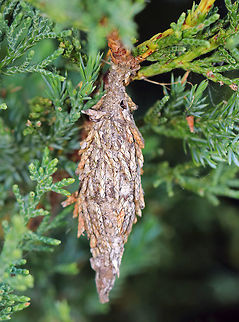
Evergreen Bagworm Moth - Thyridopteryx ephemeraeformis
Bagworms are not really worms, but are caterpillars - they are the immature stage of a moth. They're called "bagworms" because they construct bags/cases that are covered with pieces of twigs and/or leaves.
In this species, the larvae emerge from the carcass of their mother in her pupal case. These newborn larva emerge from the bottom of the hanging case and drop down on a strand of silk. The wind will then blow them to a nearby plant where they can build their own cases made of silk, fecal material, and plant bits. Adult males transform into moths in about four weeks and immediately seek out females for mating. The females never leave the cocoon, but wait for a male to stick its abdomen through the opening at the end of her case so they can mate. Females do not have eyes, legs, wings, or antennae...and, they can't eat. After her death, her offspring hatch and then pass through her body and leave the case.
This case was pretty big - around 5 cm long. I cut it open, and found remnants of a female carcass, other debris, and frass. I'm not sure what kind of tree it was on, but it was some kind of arborvitae. This photo shows the hole that was in the top of the case - I'm assuming it's the hole the male used to mate with the female.


The evergreen bagworm, commonly known as bagworm, eastern bagworm, common bagworm, common basket worm, or North American bagworm, is a moth that spins its cocoon in its larval life, decorating it with bits of plant material from the trees on which it feeds.
